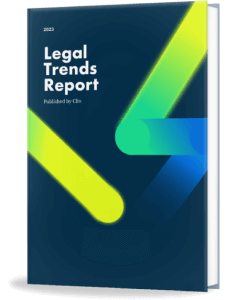Do I need a legal disclaimer for my website? For many practicing lawyers, this is a question that seldom crosses their minds until they start their own practice. Lawyers often don’t think about website legal disclaimers until they are already in the thick of running their law firms with a mountain of other responsibilities. A legal disclaimer template can help lawyers create a website legal disclaimer more easily.
(To easily create other templates, for your practice, such as legal document templates, use Clio Draft to convert your Word docs into dynamic legal templates and cut time spent on routine legal drafting by 80%! Request a demo to see how it works.)
Every lawyer is subject to professional responsibility and ethics rules in the jurisdiction they practice. However, many attorneys may not know that these ethical responsibilities also extend beyond just the practice of law—it includes the soliciting their services through marketing.
No matter your firm size or practice area, legal disclaimers are important for communicating your services to potential prospects and customers. While you should always check the ethics rules in your jurisdiction to best understand what specific information is required, this guide to legal disclaimer templates will help you get started.
What are legal disclaimers?
A legal disclaimer is an official statement that protects your law firm from potential liability. This is essentially telling people who visit your website that the information listed is not legal advice, not subject to attorney-client privilege, and so on.
Why are legal disclaimers important?
Liability problems for a firm may arise when people rely on professional advice, but do not distinguish between hiring a legal professional and reading an expert’s website or blog. This is especially the case for people who tend to seek free advice from lawyers.
A legal disclaimer sets boundaries upfront, establishes the scope of your services, and distinguishes what official legal advice and what general, publicly available information are. Having one will protect you and your firm from any potential wrongful liability lawsuits that may arise.
Do I need a legal disclaimer for my law firm website?
Yes, all lawyers need a legal disclaimer on their website.
While the content of your legal disclaimer will vary depending on your jurisdiction’s ethical rules of conduct, legal disclaimers for no attorney-client privilege from a website are typically standard.
Can I copy a legal disclaimer?
You may have seen a legal disclaimer on a website from somebody you know or a brand you’re familiar with and were tempted to copy it. However, it’s very unwise to copy a legal disclaimer from another website, even if that website belongs to another lawyer or law firm. With varying codes of conduct for different jurisdictions, if you copy a legal disclaimer from somebody else, you could risk not being covered for certain ethical responsibilities, exposing you to potential liability.
What are the benefits of legal disclaimer templates?
Legal disclaimer templates are not a catch-all net for your law firm’s website. However, they’re a good starting point for you to build off of.
It’s better to start with a blank general legal disclaimer template rather than copying somebody else’s. That way, you’ll know how to use the template and can tailor it to your specific jurisdiction and practice area.
Legal disclaimer templates will also help you understand the type of language you need to include. They also often come with detailed instructions on how to use them.

How do I write a legal disclaimer?
There are six kinds of legal disclaimer templates you may need to include on your website:
- Attorney-client privilege
- Attorney advertisement language
- Client testimonials
- Fields of specialization
- Identify website owners
- Client liability for costs
Attorney-client privilege
This first legal disclaimer is the most important and all lawyers should have, regardless of what they practice. This attorney-client privilege legal disclaimer template should include a clause that contacting you through any of the methods listed on your website (such as chat, email, or phone) does not establish an attorney-client relationship.
Many prospects that contact you may assume that they have an attorney-client relationship with you from first contact. But this clause in a legal disclaimer template should state that until the relationship is formally established and acknowledged by both parties, you do not have liability.
Attorney advertisement language
Most jurisdictions will require you to clearly state on your firm’s website that the site itself is included as part of advertising your services. The level of strictness with the language depends on the jurisdiction itself, so look for a flexible legal disclaimer template.
For example, in Missouri, you must use their exact wording detailed in (Rule 4-7.2(f) and comment). In Missouri, legal advertising materials must contain a “conspicuously” placed statement that “the choice of a lawyer is an important decision and should not be based solely upon advertisements,” with the notation that “this disclosure is required by rule of the Supreme Court of Missouri.”
Client testimonials
Word-of-mouth is a powerful marketing tool—it’s how many law firms get clients today. However, if you want to use these positive reviews on your website to encourage people to book a consultation, you will need to include a legal disclaimer.
According to comments 2 and 3 in Rule 7.1 of the American Bar Association’s (ABA) Model Rules of Professional Conduct, it is important to have no misleading information on your website. That means nothing you say about your practice should lead a reasonable person to develop unjustified expectations regarding case outcomes. This may include direct comparisons or other attorneys.
As a rule of thumb, it’s best to ensure none of your client testimonials are sensationalized or misleading. It’s also wise to find a legal disclaimer template that specifies these testimonials stem from a client’s individual case and is not necessarily applicable across all cases.
Fields of specialization
According to the ABA Rule 7.2, lawyers should not imply that they are a specialist in a specific practice area, unless they have been certified as so by an ABA-accredited organization authorized by their jurisdiction.
So, while it may be okay to say that you are focused on a certain area of the law such as appellate law, you can’t say you are an appellate law specialist or expert in appellate law unless you’ve been certified as such in your area.
As such, when looking for a legal disclaimer template, you should review ones that differentiate focusing on a practice area and specializing in a practice area.
Identify website owners
Rule 7.2 of the ABA also states that a lawyer’s website “must include the name and contact information of at least one lawyer or law firm responsible for its content.”
As a solo practitioner, this might mean only listing yourself. However, it’s wise to find a legal disclaimer template with multiple listed owners in case you need to add more contacts in the future.
Client liability for costs
The last general legal disclaimer template you may need to look for is one on contingency fees. Certain states, including Pennsylvania (Rule 7.2(h)(1)) and Texas (Rule 7.04(h)), require disclaimers to this effect if you advertise the availability of contingent fee arrangements. Check with your state’s bar association for this, as they likely have mandated language you will need to include.
Legal disclaimer samples
Below are some links to examples of legal disclaimers and legal disclaimer templates.
Final thoughts on legal disclaimer templates
Legal disclaimer templates are a great starting point for lawyers. But they are by no means a shortcut to ethical compliance. It’s important to always do research on your own practice area and jurisdiction. For example, certain states like Missouri have very specific language requirements around promoting lawyer services. As a result, you can find those kinds of disclaimers on your state bar association’s websites.
A legal disclaimer template will help you get started. But ultimately, it’s also wise to keep in mind that ethical rules and responsibilities are always changing and adapting, depending on new technology and marketing methods. It’s good to stay up to date with the latest technological trends and any new rules or regulations your state bar association publishes.
Looking for more? Be sure to check out our resource hub on legal templates.


